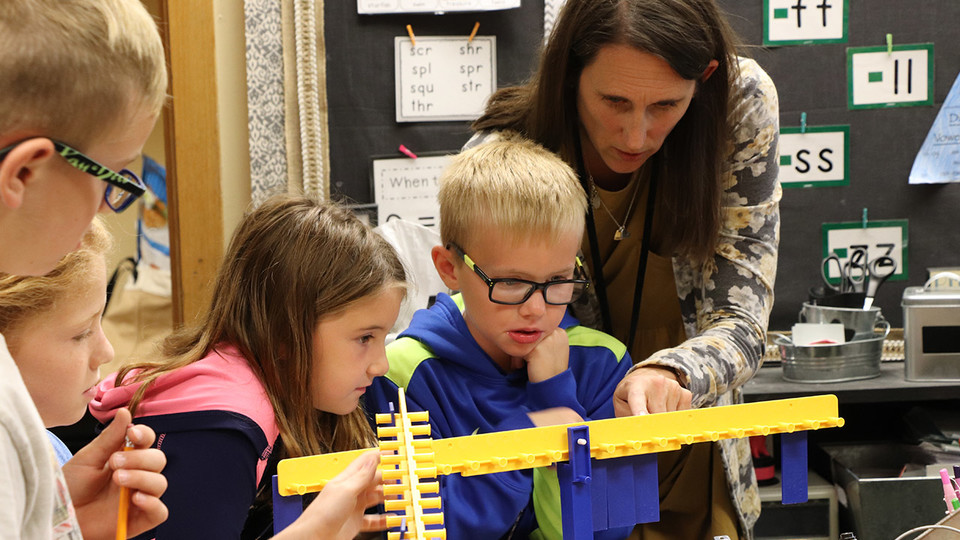Tiffany Lee, April 18, 2018 | View original publication
STEM project to benefit rural elementary schools
Up to 15 rural Nebraska elementary teachers are being sought to participate in the NebraskaSTEM leadership development program that begins this summer at the University of Nebraska–Lincoln.
Funded by a National Science Foundation Robert Noyce grant, participants will receive stipends to help pay the tuition and living costs of completing a 14-month master’s degree in elementary education with a specialization in science, technology, engineering and math education. During the five-year program, NebraskaSTEM participants will also become master teaching fellows, equipping them with content and leadership skills to support and mentor colleagues while enhancing STEM education in rural Nebraska elementary schools. Master teaching fellows also receive annual stipends of $10,500 for four years.
The NebraskaSTEM application deadline is May 1. Interested teachers in rural Nebraska elementary schools can apply here. Applications must include GRE or Praxis test scores taken within the past 10 years. One of these tests must have been completed by April 15. Summer classes begin June 11.
To be eligible for NebraskaSTEM, applicants must be a current elementary teacher in a rural Nebraska, high-needs school who is passionate about innovative STEM education and teacher leadership. A high-needs school is one where the percentage of students receiving free or reduced-price lunches has been at or above the state average within the past three years. Elementary teachers who already have a master’s degree may also apply. Other application requirements, dates and details can be found on the NebraskaSTEM website.
“By investing in teacher education and professional development, we’re really investing in better learning experiences for Nebraska students for many years to come,” said Amanda Thomas, assistant professor of mathematics education in the Department of Teaching, Learning and Teacher Education at Nebraska. “When we prepare teachers to be more effective and to be teacher-leaders, that impact extends beyond students in their classroom to students in their colleagues’ classrooms. It’s about building capacity for STEM education in rural Nebraska.”
NebraskaSTEM is funded through a $1,499,493 grant from the National Science Foundation’s Robert Noyce Scholarship Program. Thomas said previous Noyce funding has provided opportunities for many math and science teachers in Lincoln and Omaha public schools, and there was a desire to extend more opportunities into rural Nebraska.
“Rural schools often face different challenges with qualified teachers in STEM areas and with teacher turnover,” Thomas said. “Often they don’t have the same access to instructional coaches or professional development due to the nature of their size and location. By focusing on rural communities and rural teachers in this grant, we’re building a community of committed STEM teacher-leaders to support one another and impact STEM learning in rural Nebraska.”
In addition to Thomas, the team includes Wendy Smith, research associate professor in the Center for Science, Mathematics and Computer Education; Leen-Kiat Soh, professor of computer science and engineering; and Guy Trainin, professor and graduate chair of teaching, learning and teacher education. Other collaborators on the grant are from the Department of Teaching, Learning and Teacher Education and the Nebraska Center for Research on Children, Youth, Families and Schools in the College of Education and Human Sciences, the College of Engineering and the School of Natural Resources.
A research component of the grant will study how the local STEM initiatives that Noyce Master Teaching Fellows develop during the program can enhance rural elementary STEM teaching and teacher leadership to inform future programs.






